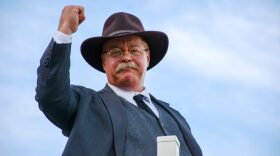24-year-old Theodore Roosevelt suffered a sorrow of volcanic proportions in February of 1884. Responding to an urgent cable from his brother, TR hastened from Albany to New York City where his wife Alice lived with his mother, Mittie. Alice was in a dangerous state of health after giving birth to their first child. In another room, Mittie was on the threshold of death from Bright’s Disease.
Roosevelt lost the two most important women in his life before dawn. In his February 14th diary, he penned “The light has gone out of my life.”
Broken in spirit he sought solace months later in the alluring place he had discovered the previous year in the far west of Dakota Territory. Western Dakota’s rugged back country, rivers, landscapes and people helped set the stage for the healing drama that would change Roosevelt’s life forever.
“I have always said I would not have been president had it not been for my experience in North Dakota. It was here that the romance of my life began. I grow very fond of this place and it certainly has a desolate, grim beauty of its own that has a curious fascination to me. There are no words that can tell the hidden spirit of the wilderness, that can reveal its mystery, its melancholy, and its charm. I do not believe there ever was any life more attractive to a vigorous young man than life on a cattle ranch in those days. It was a fine, healthy life, too; it taught a man self-reliance, hardihood and the value of an instant decision. I enjoyed the life to the fullest.”
Roosevelt elaborated in a letter from Dakota to his friend Henry Cabot Lodge:
“I heartily enjoy this life with its perfect freedom. There are few sensations I prefer to that of galloping over these rolling limitless prairies, with rifle in hand, or winding my way along the barren, fantastic and grimly picturesque deserts of the so-called Badlands. I am myself as much a westerner as I am an Easterner. And I address you in this rather solemn strain because of my pride in you and because your welfare, moral as well as material, is so near to my heart.”
Dakota Datebook written and performed by Steve Stark. Funding provided by the Theodore Roosevelt Medora Foundation.




